- The Emirates Water and Electricity Company is setting up a new low carbon desalination plant — but is it really low carbon? (Desalination)
- Hydropower may be an asset for the energy transition, but it faces massive obstacles. (Macro Picture)
- Oman’s sovereign wealth fund is eyeing Egypt’s renewable energy sector. (What We’re Tracking Today)
- Bahrain is discussing a law that could see solar panel integration mandatory for all buildings. (What We’re Tracking Today)
- Egypt, KSA may collaborate on a local supply chain for electrical components and EV charging. (On Our Radar)
- An electric scooter startup is looking to build the world’s biggest EV hub in India. (Around the World)
- Could climate change kill the traditional perfume making industry? (On Your Way Out)

Tuesday, 21 February 2023
Abu Dhabi just signed an agreement for a new low carbon desalination plant – but is it really low carbon?
TL;DR
WHAT WE’RE TRACKING TODAY

Good morning, friends. The climate news cycle is throwing us for a loop this morning with a relatively slow day, but we have quick a few EV updates from… everywhere. Let’s jump in.
THE BIG CLIMATE STORY- French utility company Engie and the Abu Dhabi National Energy Company (Taqa) are officially on board to establish a new “low carbon” reverse osmosis desalination plant in the UAE — but is it really environmentally friendly? We have chapter and verse on this story and more in the news well below.
THE BIG CLIMATE STORY OUTSIDE THE REGION- The majority of the world’s regions most vulnerable to climate change-driven extreme weather are in China, according to research published yesterday by climate assessment firm XDI. In a study of 2.6k regions across the world, researchers found that nine out of the 10 most at-risk regions are in China — largely because the country’s infrastructure investment has focused on areas vulnerable to extreme weather, including coastal zones and river deltas.
In our neck of the woods: Egypt’s Beheira Governorate was the highest-ranked region in MENA in the list (#58) while Saudi capital Riyadh was #330. Fourteen regions in Egypt were among the 500 most vulnerable areas to extreme weather.
The story is getting coverage in the international press: Reuters | AFP | CNBC | South China Morning Post | The Independent.
HAPPENING TODAY- The World Environment, Social and Governance Summit in Dubai starts today and runs through to Thursday. The summit will host discussions on reducing carbon emissions and the urgency to incorporate ESG. Stakeholders from various fields will address the financial and strategic aspects of implementing ESG policies.
THIS WEEK-
Another round of UN Ocean Treaty talks begins in New York: UN talks to establish the world’s first legally binding Ocean Treaty — aimed at establishing rules to protect biodiversity in vast swathes of ocean that lie outside territorial waters — resumed yesterday, and will see representatives from hundreds of countries gather in New York until 3 March, Reuters reports. An earlier round of talks was suspended in August — with financing, how to share the proceeds of “marine genetic resources,” and establishing ocean environmental impact assessment rules for development all being major sticking points preventing a final agreement, the outlet noted. Appetite to finalize the treaty appears to have increased since then, according to experts. But the success of the talks still “hinges on the finance question,” Reuters quoted Greenpeace global policy advisor Li Shuo saying.
WATCH THIS SPACE #1 – Egypt’s renewable energy sector is being eyed by Oman’s sovereign wealth fund for potential investment opportunities, Al Shorouk reported, citing sources with knowledge of the matter. A delegation from the Oman Investment Authority (OIA) visited Cairo earlier this month and expressed interest in investing across a number of sectors in Egypt’s economy, including energy and renewables, the outlet reports. The report comes two weeks after Planning Minister Hala El Said and Sovereign Fund of Egypt CEO Ayman Soliman visited Oman as part of a regional tour aimed at drumming up interest among Gulf investors for the country’s privatization program.
WATCH THIS SPACE #2 – Bahraini officials are discussing a law that could see solar panel integration mandatory for all buildings, Zawya reported last week. Members of the Southern Municipal Council proposed construction permits be granted “only to citizens and residents who submit designs incorporating solar panels for new houses, apartments or buildings,” according to the news outlet. For existing properties, the proposal recommends that owners be given a grace period to allow them time to install and operate solar panels on the rooftops.
WATCH THIS SPACE #3 – The UK is set to clamp down on greenwashing: New UK legislation may see corporations cough up some 10% of their annual income if they are found to be making misleading environmental claims to advertise their products, according to the Guardian. The bill— which UK PM Rishi Sunak says is currently a government priority — would also see the country’s competition regulator impose fines of up to GBP 300k on individuals found to be in breach of consumer law.
WATCH THIS SPACE #4 – Uber to introduce EVs in its India market: Ride-sharing giant Uber has plans to introduce 25k electric vehicles (EVs) to its India fleet over the next three years, Reuters reports. The move comes on the heels of the Indian government’s push for green transportation. The ride-hailing company wants all of its rides to be in zero-emission vehicles by 2040, according to the news outlet.
|
***
YOU’RE READING ENTERPRISE CLIMATE, the essential MENA publication for senior execs who care about the world’s most important industry. We’re out Monday through Thursday at 4am Cairo / 5am Riyadh / 6am UAE.
Were you forwarded this email? Get your own subscription without charge here or reach out to us on climate@enterprisemea.com with comments, suggestions and story tips.
***
CLIMATE DIPLOMACY- KSA, US talk renewables: Progress on renewable energy projects were on the top of the agenda during a meeting held in Riyadh earlier this week between Saudi Energy Minister Prince Abdulaziz bin Salman and a delegation of US Senate members headed by Republican Senate leader Mitch McConnell, a ministry press statement reports. The two countries have been expanding their partnership in green projects — including carbon capture utilization and storage — with Saudi Arabia’s cabinet approving the long-awaited “Partnership Framework for Clean Energy Development” with the US last month. A large number of agreements were also signed in July of last year, Reuters reported at the time.
The UAE and Turkmenistan reaffirmed agreements to boost cooperation on renewables earlier this week, according to a statement. President Serdar Berdimuhamedow met with Deputy Prime Minister Mansour bin Zayed Al Nahyan to discuss the implementation of several large-scale joint projects in a number of fields including renewable energy.
COME TO OUR NEXT ENTERPRISE FORUM-
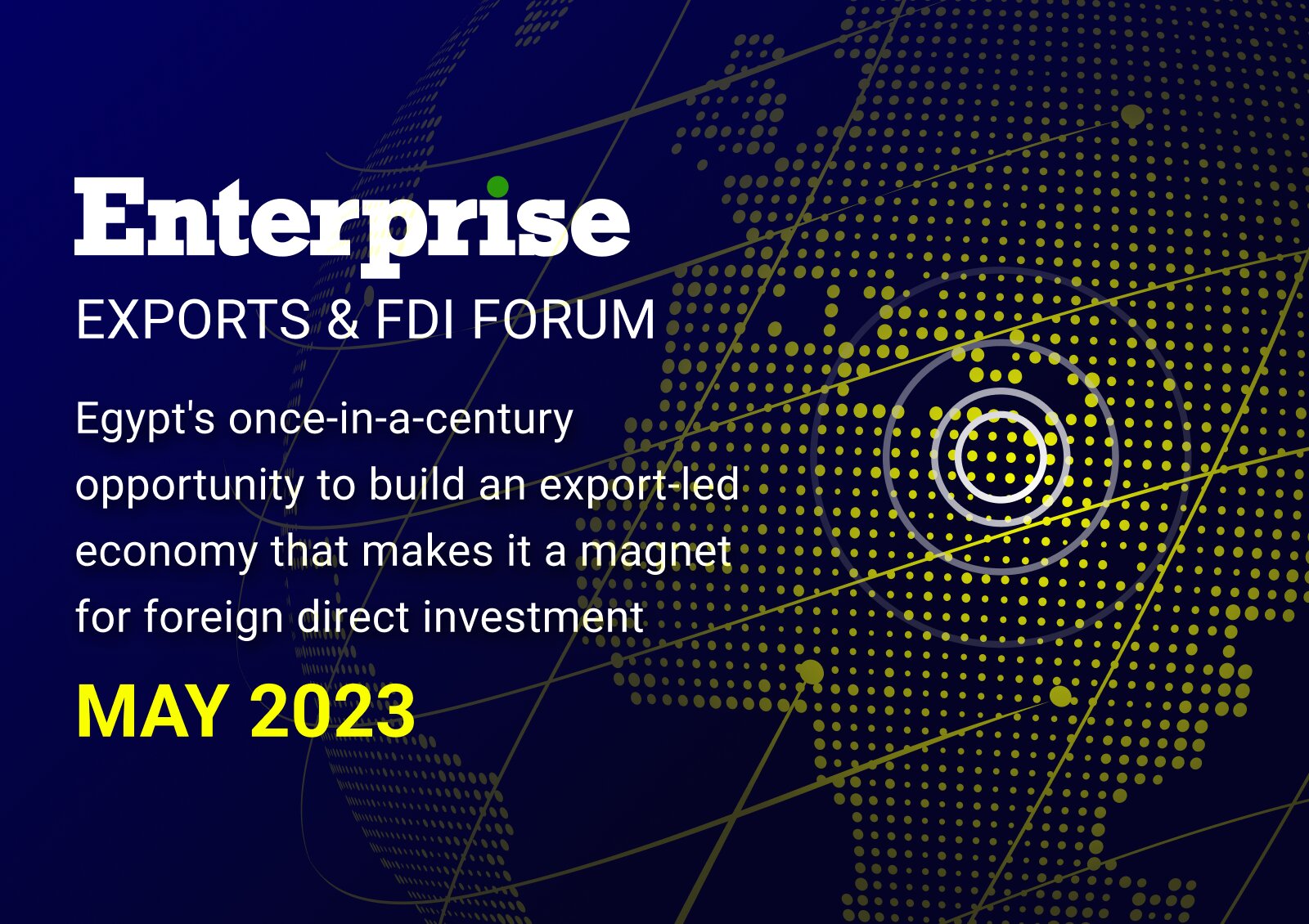
We’re excited to unveil our next C-level event in Cairo: The Enterprise Exports & FDI Forum, where we will take a deep dive into two of the most critical topics affecting our community.
Interested to learn more about how Egypt is planning on drumming up foreign direct investment (FDI) for all these green hydrogen, solar and wind agreements? Exports and FDI have never been more important to Egypt’s economy — or its businesses — than in the wake of the float of the EGP and the country’s positioning as a regional renewable energy hub. We think there’s a unique chance to build an export-led economy that makes Egypt a magnet for FDI and all the benefits that will come with it.
Want to join the conversation? Drop us a line on events@enterprisemea.com.
CIRCLE YOUR CALENDAR-
The UAE will host the Annual Gulf Ins. Forum from Monday, 27 February to Tuesday, 28 February in Dubai. The event will host panel discussions on sustainable ins. for ESG, the role of Gulf ins. companies in securing renewables, the future of ins. for Autonomous Vehicles (AVs), ins. solutions to address climate change and environmental pollution, and the banking sector’s experience in issuing green and sustainability bonds. You can register for the event here.
Qatar will host the International Conference on Climate Change and Human Rights from Tuesday, 21 February to Wednesday, 22 February in Doha. The conference will gather over 300 participants from governments, think tanks, universities, and human rights institutions to discuss and present climate mitigation and adaptation policies from a human rights perspective.
Egypt will host the CSR Forum from 2-5 March at Somabay, Hurghada. The event aims to further discussions put forth during COP27 and boost private and public sector cooperation on climate action. You can register for the event here.
The Arabia CSR Awards is accepting applications until Friday, 30 June. The awardwinners will be announced during a ceremony on Wednesday, 4 October.
The first MENA Solar Conference is accepting applications from published researchers specialized in PV technology until Sunday, 30 April. The Dubai Electricity and Water Authority will be hosting the conference from 15 to 18 November, in conjunction with the Water, Energy, Technology, and Environment Exhibition and the Dubai Solar Show 2023. Researchers can submit their papers here.
Check out our full calendar on the web for a comprehensive listing of upcoming news events, national holidays and news triggers.
DESALINATION
Engie + Taqa to establish “low-carbon” desal plant in Abu Dhabi
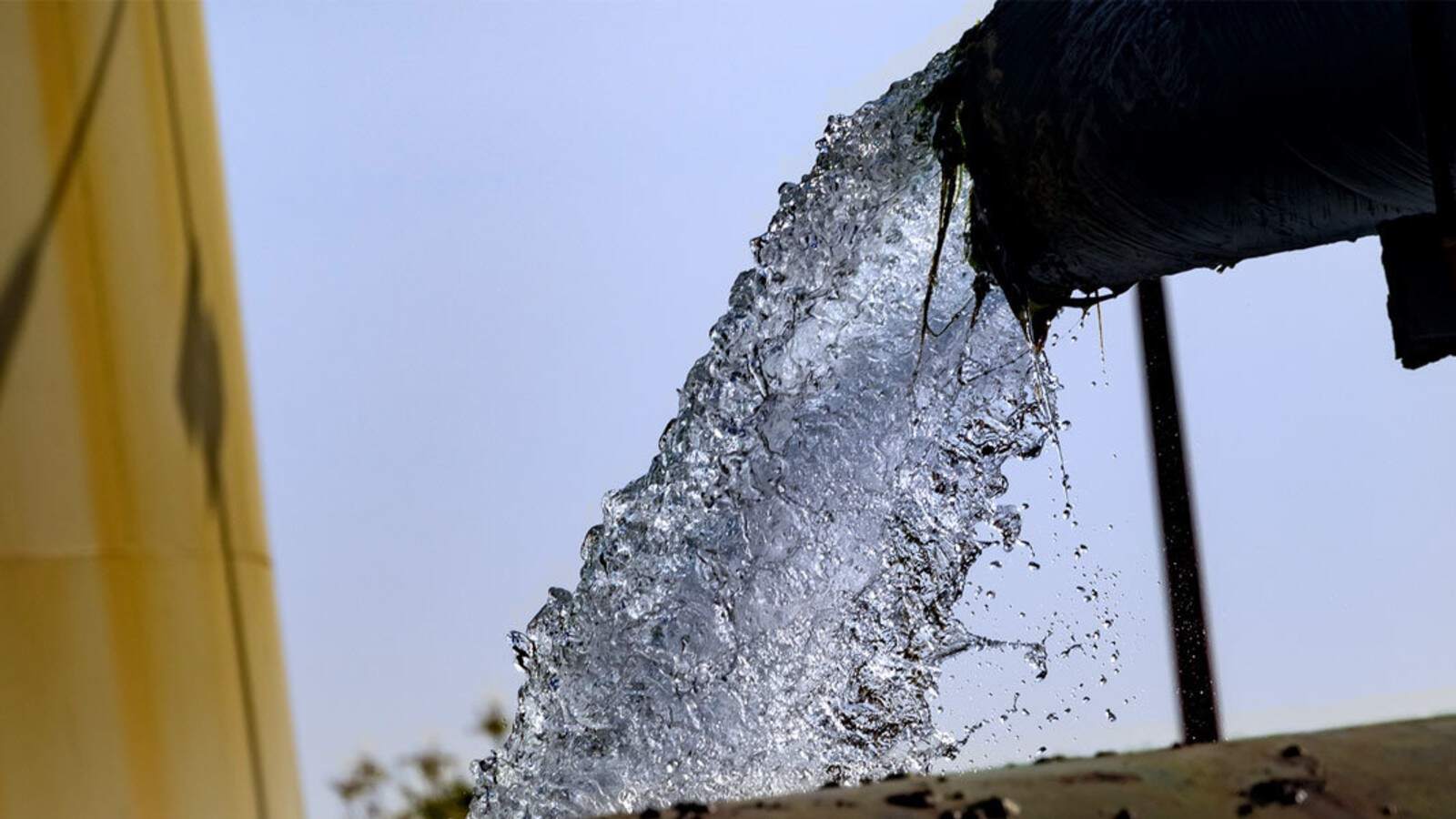
Abu Dhabi awards “low-carbon” desalination plant to Engie + Taqa: French utility company Engie and the Abu Dhabi National Energy Company (Taqa) will establish a “low carbon” reverse osmosis desalination plant in Abu Dhabi under a water purchase agreement signed with the Emirates Water and Electricity Company (EWEC), according to a statement out yesterday. Under the contract, the consortium will be responsible for the development, financing, construction, operation, maintenance and ownership of the plant.
What we know about the plant: The Mirfa 2 Reverse Osmosis (M2 RO) desalination plant will be the third-largest plant of its kind in the UAE, producing up to 550k cubic meters of water a day and serving 210k households, EWEC said. Taqa will have a 60% equity stake in the project and Engie will hold the remaining 40%. The project is expected to reach financial close in 1Q 2023, with initial production beginning in summer 2025 and full production underway by 3Q 2025. EWEC didn’t disclose any financial details related to the project.
Engie was rumored to have secured the contract last year: Infrastructure publication IJGlobal reported in September that EWEC had selected Engie for the project from among four bids. The French firm reportedly offered USD 0.4832/m3, lower than bids submitted by Acciona, GS and Acwa Power.
Advisors: Alderbrook acted as financial advisor to EWEC while White & Case were counsel, according to IJGlobal.
There are more plants in the pipeline: EWEC called in September for developers to bid on building two new reverse osmosis water plants, which it also termed “low carbon.” The plants are set to be located on the islands of Saadiyat and Hudayriat and will provide some 455k cubic meters of water a day — enough to supply up to 180k households. EWEC already operates six reverse osmosis desalination plants.
Reverse osmosis plants are more efficient: EWEC said that reverse osmosis is up to 96% more efficient than thermal desalination.
And have a lower carbon footprint: Depending on the fuel source, reverse osmosis plants produce 2.1-3.6 kg of CO2 per m3, far lower than thermal desalination which produces up to 16 kg and multistage flash which reaches as high as 20 kg.
But how they’re powered is key: Reverse osmosis plants can’t be considered truly “low carbon” as long as they continue to be powered by fossil fuels, which according to Acwa Power CEO Paddy Padmanathan, are currently used in around 70% of desalination plants in the Gulf. EWEC is yet to disclose how power used for the M2 plant will be generated.
Reverse osmosis plants are also highly energy intensive: This method of desalinating water requires 3-10 KWh of energy to produce 1 cubic meter of water, far higher than the 1 KWh used in traditional water treatment plants.
Brine is still a problem: Like other types of desalination plant, reverse osmosis plants produce brine, which can cause ecological damage if not disposed of properly.
Ultimately, the best way to decarbonize desalination is by using renewable energy: Using renewable energy to power reverse osmosis could significantly reduce its cost and environmental impact, according to Padmanathan. There’s “huge potential” for renewable desalination, notes a 2020 article by KSA-headquartered Abdul Latif Jameel — which operates in a number of sectors, including energy and renewables. Using clean energy to power desalination is a major goal for the Global Clean Water Desalination Alliance, which brings together key stakeholders in multiple sectors to try to slash emissions from desalination. The alliance was targeting 20% of new desalination plants to be powered by renewables from 2020-2025, according to the Abdul Latif Jameel article.
MACRO PICTURE
Hydropower may be an asset for the energy transition, but it faces massive obstacles
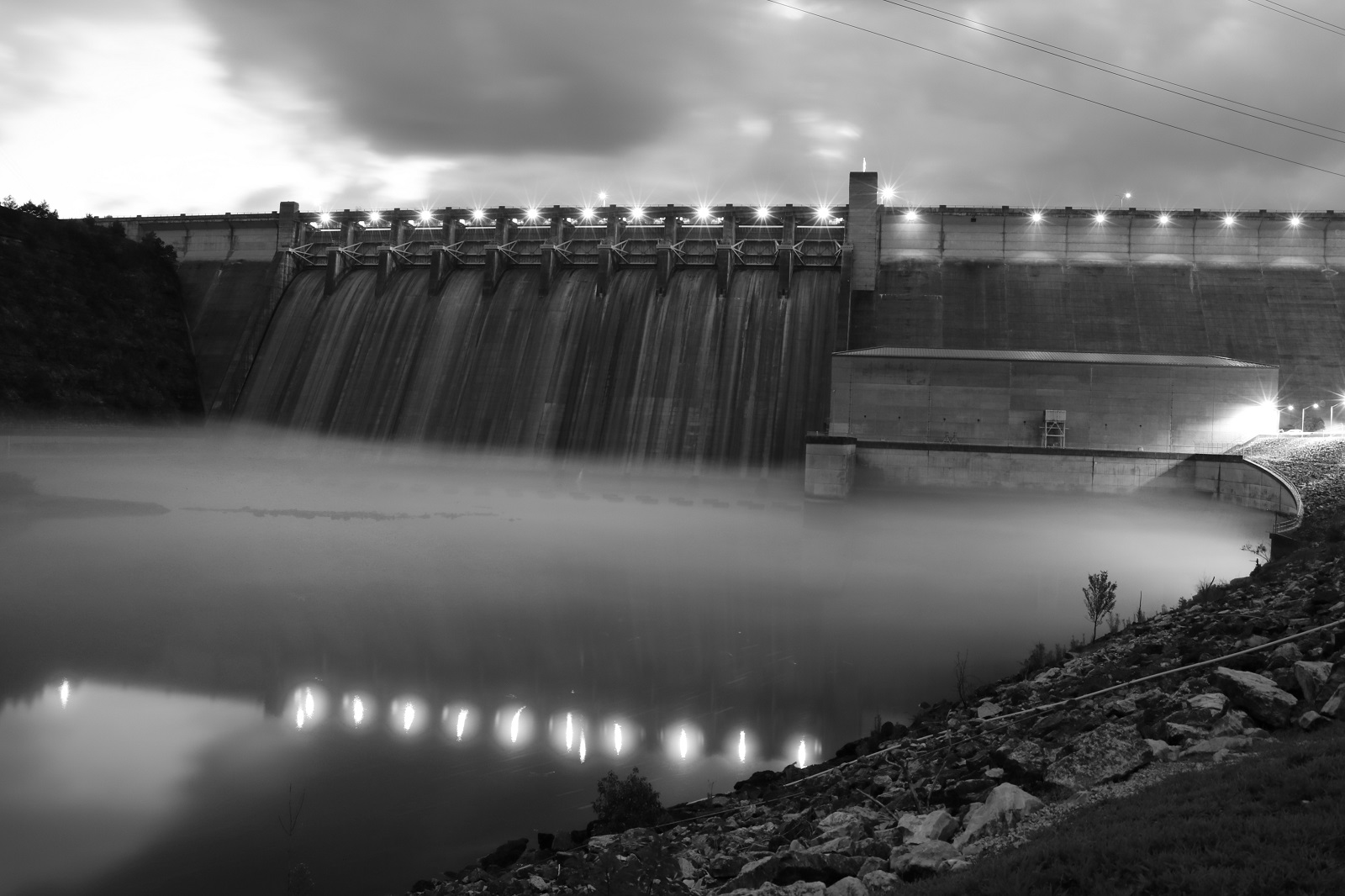
With 650 GW of projects in the global power pipeline by 2050, hydropower stands to be an asset for the green transition despite falling behind solar and wind, according to a recent report (pdf) by the International Renewable Energy Agency (Irena). Throughout the last decade, hydropower investments have been overshadowed by solar and wind technology despite being the greatest source of renewable energy in terms of installed capacity and electricity production, the report states, adding the potential in clean power generation for developing nations like Egypt, Sudan, Morocco, Iraq, and Iran.
A brief history: Hydropower produced 65% of all renewable energy worldwide in 2019, roughly 4.3 PWh (that’s 1 mn GW) of electricity, the report states. Between 2000 and 2021 alone, the installed capacity of conventional hydropower increased by more than 75%, totaling over 1.2k GW. Despite the amount of renewable energy it produced, hydropower only received USD 72 bn in funding between 2013 and 2018.
Funding saw an increase, but there’s still a ways to go: Despite a decline in investments between 2013 and 2016, hydropower saw an uptick in funding in 2017 (USD 26 bn) and 2018 (USD 15 bn) with private capital accounting for only 25% of the total amount. The current installed capacity needs to at least double by 2050 for the world to achieve net zero and comply with the Paris Agreement of keeping temperature increase below 1.5 °C.
Africa is on the right track in terms of generation: In 2021, the continent’s total hydropower capacity was at 34.3 GW — and a supplementary 3.2 GW of pumped storage hydropower (PSH) courtesy of South Africa (86%) and Morocco (14%), according to Irena’s report. As of 2020, Egypt’s hydropower capacity stood at some 15k GWh out of a total capacity of c. 192k GWh — or 7.8% of the country’s energy mix. Morocco’s hydropower capacity stood at some 1.3k GWh in 2020 out of a total capacity of c. 40k GWh — or 3.2% of the energy mix. By 2037, the report states projects in the pipeline are projected to yield an additional 60.8 GW with Ethiopia leading the way with a 25% share. Egypt will provide 49% of the continent’s 4.9 GW of stored power, and South Africa and Morocco will provide the remaining 31% and 20% respectively.
But MENA is not: The region’s installed capacity stood at 14.5 GW in 2021 with Iran contributing 74% — and the prospects of growth are underwhelming. Only 5.3 GW worth of power is expected to come online by 2037 as Iran’s production capacity expands up to 92% of the regional generational capacity.
And water scarcity is the culprit: Conflict between Iraq, Syria, Turkey and Iran over water distribution has led to severe water shortages and Iraq currently needs USD mns to combat desertification.
Despite challenges, hydropower still has important advantages: With the potential to produce hundreds of GW of clean energy per annum, according to a 2017 study published in the Nature Energy Journal. Hybrid renewables projects — like floating PV panels on water reservoirs — are efficient space-saving options, the study notes, and hydropower can support wind and solar power generation when weather conditions are suboptimal.
But the infrastructure needs a makeover: The aging hydropower infrastructure runs the risk of becoming obsolete and countries will need to modernize existing structures to achieve long-term power generation efficiency, the Irena report states. Funding — particularly from private players and entities — is lagging behind and efforts could be made by all stakeholders to advance swift solutions, along with government support through tax exemptions and concessional grants, the report adds.
And there are looming environmental challenges in the way: Climate concerns and their effect on dwindling global water supplies are presenting a serious threat, as the world’s biggest dams are jammed with sediment which threatens additional global water storage losses. Global water reservoirs may lose storage capacity totalling 1.6 bn cubic meters of water by 2050.
ALSO ON OUR RADAR

Croatian Koncar and Saudi’s Al Massa could build EV chargers in Egypt: Croatian electrical equipment manufacturer Koncar could establish a factory for manufacturing EV chargers in Egypt, the Egyptian cabinet said in a statement on Sunday. This came during talks between Prime Minister Moustafa Madbouly and representatives of Koncar and Saudi contractor Al Massa Group, which acts as Koncar’s local agent. Al Massa Chairman Al Sharif Saud said the firms are also considering manufacturing electrical components for power transmission infrastructure.
OTHER STORIES WORTH KNOWING ABOUT THIS MORNING-
- A delegation from Dubai’s Water and Electricity Authority (Dewa) is in Lithuania to meet with spacecraft engineering company NanoAvionics to follow up on the development of a nanosatellite intended to support the digitalization the country’s power networks and facilitate the roll-out of smart grids and EV charging stations. Dewa plans to launch the new technology later this year. (Dubai Media Office)
- Saudi researchers have invented manufacturing tech for EV batteries that can bring down charging time to 12 minutes and weigh 20% less than their traditional counterparts. (Saudi Press Agency)
AROUND THE WORLD
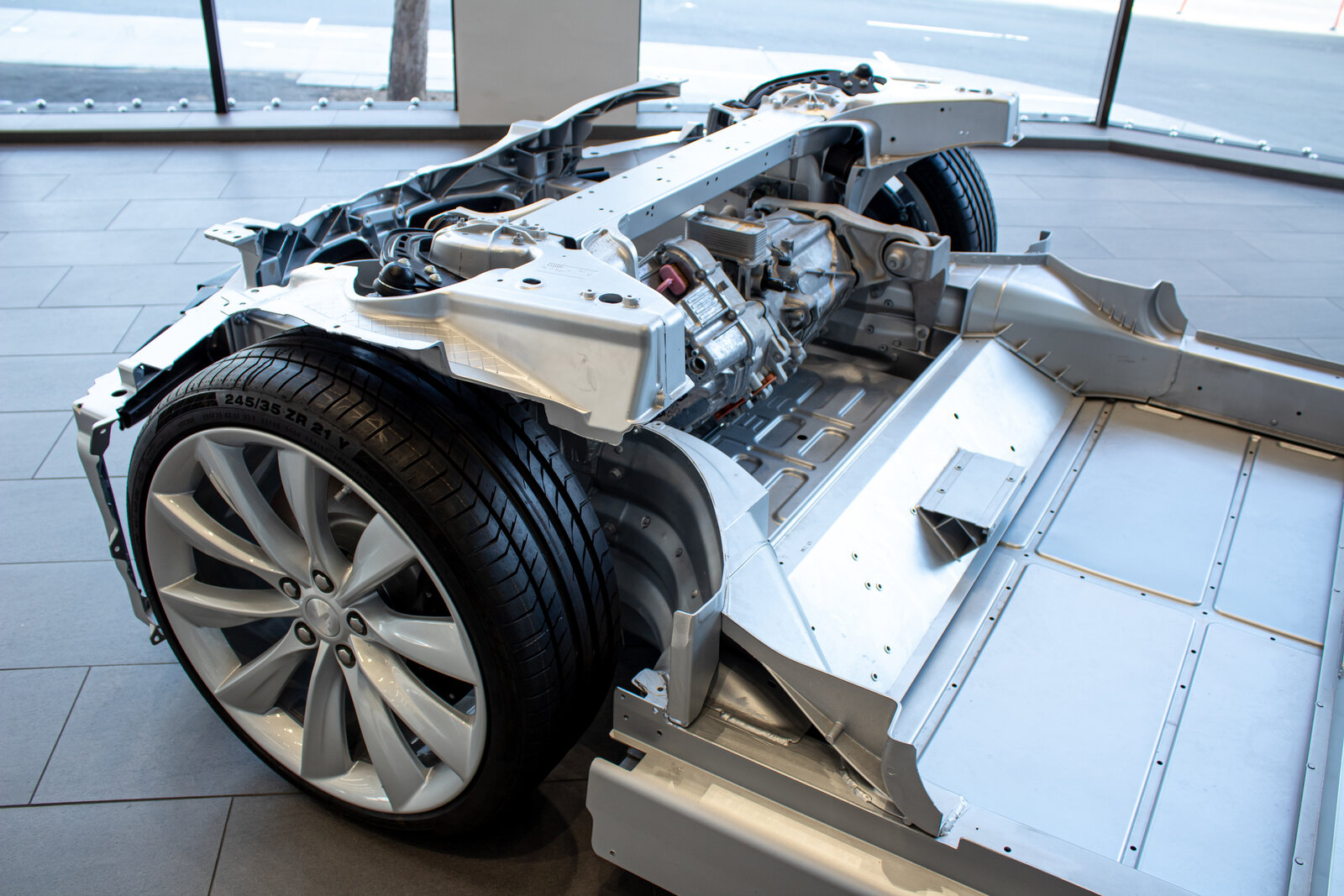
India’s electric scooter startup Ola Electric Mobility will build the world’s largest electric vehicle (EV) hub worth USD 920 mn in the Tamil Nadu state, Bloomberg reports. The company intends for the mega hub to localize its supply chain and manufacture cars and battery cells, as well as house vendors and suppliers. Plans to mass produce the cells will kick off later this year, the business news service reports.
ON YOUR WAY OUT
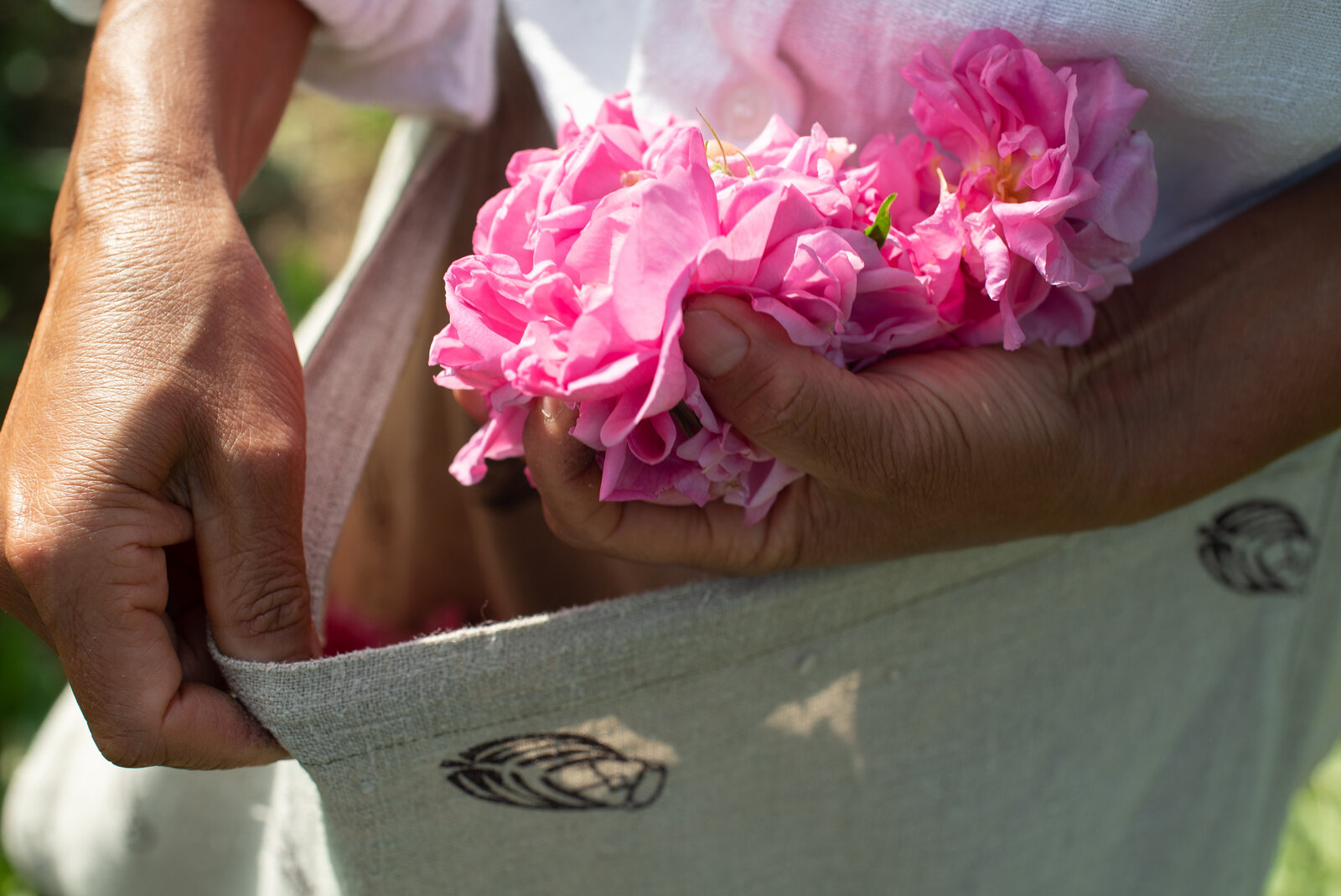
Climate change is threatening French perfumiers: The French town Grasse is experiencing extreme weather patterns that are threatening the harvest of flowers essential for the 400 year-old tradition of perfume making, the Guardian reports. Drought, excessive rainfall, and higher temperatures have created challenging conditions for growing flowers, and some producers lost nearly half of their harvest last summer to extreme drought conditions, the news outlet reports.
Could brands turn to synthetic scents? The decline in harvests have caused their prices to shoot up, but luxury brands like Chanel and Dior have decided to keep their prices unchanged. Some predict that those brands will soon opt to either increase their prices or use synthetic alternatives which would threaten the livelihood of growers worldwide. Some perfume houses argue that perfume crops aren’t environmentally friendly because growing the volume of flowers needed for perfume-making requires abundant water, and shipping raw materials globally causes carbon emissions. “It’s more sustainable to make perfume in the laboratory,” a perfume business owner told the newspaper.
CALENDAR
FEBRUARY 2023
27-28 February (Monday-Tuesday): The Annual Gulf Ins. Forum, Dubai, UAE.
MARCH 2023
7-9 March (Tuesday-Thursday: Middle East Energy Exhibition, Dubai World Trade Center, Dubai, UAE.
14-16 March (Tuesday-Thursday): Arab Aviation Summit (AAS), Al Hamra International Exhibition & Conference Centre, Ras al Khaimah, UAE.
15-19 March (Wednesday-Sunday): Qatar International Agricultural and Environmental Exhibition, Doha, Qatar.
22-24 March (Wednesday-Friday): K.ey – The Energy Transition Expo, Rimini Expo Centre, Emilia-Romagna, Italy.
22-24 March (Wednesday-Friday): UN 2023 Water Conference, New York, NY, United States.
APRIL 2023
6 April (Thursday): Arabia CSR Awards 2022 Clinic (online).
MAY 2023
1-4 May (Monday-Thursday): Arabian Travel Market, Dubai, UAE.
2-7 May (Tuesday-Sunday): Salon International de l’Agriculture au Maroc (SIAM), Meknes, Morocco.
16-18 May (Tuesday-Thursday): Seatrade Maritime Logistics Middle East, Dubai, UAE.
29-31 May (Monday-Wednesday): Electric Vehicle Innovation Summit, Abu Dhabi, UAE.
JUNE 2023
1-3 June (Thursday-Saturday): Envirotec and Energie Expo, Tunis, Tunisia.
13-14 June (Tuesday- Wednesday) The Arab Green Summit, Dubai, UAE.
13-14 June (Tuesday- Wednesday) Bloomberg New Economy Gateway Africa Conference, Marrakesh, Morocco.
SEPTEMBER 2023
Chariot Limited and Total Eren’s feasibility study on a 10 GW green hydrogen plant in Mauritania to be completed.
OCTOBER 2023
2-4 October (Monday-Wednesday): WETEX and Dubai Solar Show, Dubai, UAE.
4 October (Wednesday): Arabia CSR Gala Awarding Ceremony, UAE.
NOVEMBER 2023
30 November – 12 December: Conference of the Parties (COP 28), Dubai, UAE.
EVENTS WITH NO SET DATE
End-2022
KSA’s Neom wants to tender three concrete water reservoir projects to up its water storage capacity by 6 mn liters.
2023
Early 2023: Egypt’s KarmSolar to launch KarmCharge, the company’s EV charging venture.
1Q2023: Oman will award two blocks of land for green hydrogen projects in Duqm, Oman.
Mid-2023: Sale of Sembcorp Energy India Limited to consortium of Omani investors to close.
Phase C of the 900-MW of the Mohammed bin Rashid Al Maktoum Solar Park in Dubai to be completed.
Saudi Basic Industries Corporation (Sabic) steam cracker furnace powered by renewable energy to come online.
4Q2023: Oman to award four blocks of land for green hydrogen projects in Thumrait, Oman.
2024
End-2024: Emirati Masdar’s 500 MW wind farm in Uzbekistan to begin commercial operations.
QatarEnergy’s industrial cities solar power project will start electricity production.
First 1.5 GW phase of Morocco’s Xlinks solar and wind energy project to be operational.
2025
Second 1.5 GW phase of Morocco’s Xlinks solar and wind energy project to be operational.
UAE to have over 1k EV charging stations installed.
2026
1Q 2026: QatarEnergy’s USD 1 bn blue ammonia plant to be completed.
End-2026: HSBC Bahrain to eliminate single-use PVC plastic cards.
Iraq’s Mass Group Holding wants to invest EUR 1 bn on its thermal plant Mintia in Romania to have 62% of run on renewable energy, while expanding its energy capacity to at least 1.29k MWh.
2027
MENA’s district cooling market is expected to reach USD 15 bn.
2030
UAE’s Abu Dhabi Commercial Bank (ADCB) wants to provide AED 35 bn in green financing.
UAE targets 14 GW in clean energy capacity.
Tunisia targets 30% of renewables in its energy mix.
Qatar wants to generate USD 17 bn from its circular economy, creating 9k-19k jobs.
Morocco’s Xlinks solar and wind energy project to generate 10.5 GW of energy.
2035
Qatar to capture up to 11 mn tons of CO2 annually.
2045
Qatar’s Public Works Authority’s (Ashghal) USD 1.5 bn sewage treatment facility to reach 600k cm/d capacity.
2060
Nigeria aims to achieve its net-zero emissions target.
Enterprise Climate is available without charge thanks to the generous support of HSBC (tax ID: 204-901-715), the leading corporate and retail lender in Egypt; and Infinity Power (tax ID: 305-170-682), the leading generator and distributor of renewable energy in Africa and the Middle East. Enterprise Climate is delivered Mon-Thurs before 4 am UAE time. Were you forwarded this copy? Sign up for your own delivery at climate.enterprise.press. Contact us on climate@enterprisemea.com.

